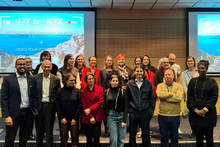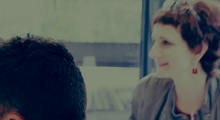A look back at the first Réussites Solidaires: working...

Adrien, KEDGE alumnus living in Vietnam since 2012
Meeting with Adrien Bizouard, KEDGE graduate living in Ho Chi Minh in Vietnam and head of the Alumni branch. Country Manager at Robert Walters, He talks about his experience as an expat.
Hello Adrien. To begin with, tell us about your educational background. What training did you get at KEDGE and before you started at KEDGE?
I did an IUT in Marketing Techniques in Bourgogne, and after that I went to Alberta, in Canada, as part of a university exchange. Then I did KEDGE’s Business ad Commerce Masters programme (in Merignac at the time) for two years. I came to Vietnam for the final phase of my degree after my second year at KEDGE, and I’ve been here six years now.
Tell us about your decision to move to Ho Chi Minh, in Vietnam?
I met my girlfriend (now my fiancée) at KEDGE. We were in the same year group. She had already lived in a few other countries, notably Syria and Cameroun. She had the wanderlust as well. I had travelled quite a bit and had always in mind that I'd go abroad, and to countries that are more exotic than France, for the culture, to have fun, etc. Since we spoke both French and English, and Ornella spoke Italian (Ornella Valat is Adrien’s fiancée), Latin America was quickly excluded. South East Asia quickly came to mind as a destination, for budgetary reasons, as well as for its economic vitality and proximity to France.
Adrien Bizouard, Country Manager at Robert Walters in Ho Chi Minh, played the “1 Minute / 1 Kedger” game for the KAS - Kedge Asian Success Team His complete interview will be available soon. w / @Cyril Colliot, Romane Clerc and Maud Ribaucourt
Published by KAS - Kedge Asian Success on Sunday, May 20, 2018
We had a Vietnamese friend from Hanoi in our class, so we sent about ten CVs to do internships here. Since we received responses from almost everyone, we decided to go. Tickets were only 450 euros. We only bought one-way tickets and told ourselves we’d see how it goes. We’re still here, and we haven’t been disappointed. It’s super dynamic here, so it’s a good decision for the moment.
Tell us about your professional career since you moved to Ho Chi Minh?
I did my end of studies internship for six months in a little Japanese agency called “Iconic”. Then I started working for Robert Walters five years ago, in March 2013 to be exact, as a consultant in the healthcare recruiting division. And four years later, in April 2017, I became a Country Manager with Robert Walters, which is about one year ago today.
How does your business adhere to the corporate social responsibility and ethics market?
Well, that’s a good question. Especially in Vietnam, because it’s not green. Vietnam is one of the largest consumers of plastic in the world, along with Thailand, Indonesia, and India.
Regarding the social responsibility aspect, we have - at the international corporate level - a global “Charity Day”. For one month, in October, we play games between us to raise money. Last year, I think we raised around $2,500, which we donated to an orphanage.
I’d love to begin to see less plastic at the office, so we are looking into purchasing glasses and straws made of bamboo to give to clients. We plan to organise a Charity Day around that theme – spend a day where we work with an NGO and collect litter from the streets with clients and candidates. We'll have around 60-70 people cleaning one area of the city. This project is in the works, but it’s something to do because the younger generation of Vietnam aren’t aware of this because they haven't been told about it.
I think that, as an international recruitment agency, Robert Walters has a responsibility to do beneficial things, especially in a developing country such as Vietnam. I think we are responsible for setting an example and informing people about these problems, even working with an NGO, or watching films about the plastic waste generated by Vietnam and what must be done to remediate it. Robert Walters is listed on the stock exchange, and even has a fairly large CSR budget, so yes, we work on it.
In terms of work cultural, what differences have you noticed between France and Vietnam?
That’s a good question because I didn’t work much in France. As to the structure and hierarchy in Vietnam, it’s straightforward. Say that you are going to speak with your N+1, N+2 et N+3. In France, it’s like pulling teeth. You must set up two or three meetings and then you run the risk that they will be postponed for three months. Here, it is absolutely no problem to call the general manager when you are working on a business development project. It’s considered to be a good thing that you can call the general manager of a giant company like Unilever, MSD, or GSK that is on the floor above. You can go up to their office, or they’ll come down to yours. It’s much more open here from the standpoint of interaction with colleagues.

In regard to promotions, its more meritocratic. Vietnam has an economy that is growing very fast - it has seen a rise of 6 to 7% per year for the last five years, and there are industries (health and industrial) with figures that between 12 and 15%. When business is good, people get promoted and salaries increase. You see this often at Robert Walters, and I’m an example. I would never have had this in another country. When you have a good head on your shoulders, put in the hours, and things go well, it happens much faster than in France.
From a purely demographic perspective, the generation here is much younger. There are many more young people here than there are in Europe. This creates a stimulating atmosphere, and there is a march towards new technologies, towards everything that is digital. There is very little resistance to change here. Everything is done easily. I think that in France, if someone wants to put things into place, you have to get a certain number of “approvals”. In Europe, positions such as the "Change Management" have been created. Vietnam doesn’t need anything like that because everything is always changing. I’d say that these are the most notable differences.
What are your ambitions for the future? Where do you see yourself in 5 years?
The recruiter is supposed to ask that question (laughs). Honestly, for the moment, Ornella and I made the decision as a couple to be here, which has allowed us to be together, and we will decide - as a couple - when to eventually leave. We had thought about doing something different last year, but with my promotion, and that fact that things were going well for Ornella as well, we never seriously considered it.
In 5 years, I hope there will be someone at work who tells me “if you do not give me your job, I'll break you”. I hope it will happen before 5 years. And the day it happens, I'll go somewhere else, and I'll do something else. Recruitment has been my first real job, so it meets a lot of my expectations. Will it happen in two, three, five years? I don’t know. It’s stimulating to have an office structured like ours, located where we are, and the pressure that goes with it too. Right now, there are 35 of us, but we should have about 40 people working for us by the end of the year. All this is stimulating.
Since I’m only 31, I don’t make too many plans because I don’t know what awaits me. There are companies on our floor where there is no one stays for a year. I think that by late 2019 or 2020 there will be too many here and we will take that space, which will be another challenge. Or we will open an office in Hanoi. I don’t know. For now, from a management point of view, recruitment opens a lot of doors in general: leadership and self-development. As long as I continue to learn, I will keep going. Chances are I will not be in Vietnam in five years if I've found someone in house who can replace me.
How did KEDGE help you achieve your goals?
KEDGE’s reputation, and the fact that I have my Master’s, clearly helped me get the of end of study internship. The type of diploma is very important to the Japanese, and without it they wouldn’t have even looked at my resume. Also, I wouldn’t have gotten a work permit here if I hadn’t had a Master’s.
KEDGE also helped me get my 4th year internship, in a firm called Vidal Associés in Bordeaux, which worked with the school. That's how I got in the recruitment business, so it made sense to continue with it.
It also helped that a student in our marketing class suggested that we go to Vietnam. As to the courses themselves, the international trade and geopolitical aspect of Asia interested us. The professional and generalist training we received opened the field of possibilities.

What were your fears before moving abroad?
That I would return after 5 months, look for work in France, and be told that there are 100,000 others like me, and that there is not enough work. It was a bit like this: go to Paris to have a SMIC, pay 800 euros a month in rent for 25 m2 flat, and not have any money.
I never really doubted the potential of working in Vietnam, because all the indicators were positive. There is a rather strong French community, so there are always people who can help each other. Also, it's a city where you can live very well on a salary of between 1000 and 1500 euros per month. I knew we were going to manage, so I didn't have any real worries about not finding anything career-wise and be forced to return. But we never felt that way after we got there. Even during the first 5 months, everything was always smooth and fast.
What advice would you give to a student who is thinking about having a Vietnamese experience?
I would say to be fairly clear about what you want to do. Also, don’t be afraid to specialise. I think there is always the argument that “if I specialise, I’ll put myself in a pigeon-hole, I’ll be hindered, I will be typecast, etc”. But as more time goes by, the more you will be typecasted anyway. So, either you decide to have a career and be typecast no matter what you do or tell yourself that you will try a lot of stuff and in the end, you won't have learned anything because you haven’t specialised. So yes, maybe you haven't been typecast, but,in the end, you won’t have learned much. So, I would tell you to not to be afraid to specialised training. There may be a risk that you don’t like it, but at the end of the day, it’s what employers are looking for. They are looking less and less for those with general business experience.
I am sorry for those in communications, marketing, or business development. I think that marketing is a very useful tool, but if you want to do marketing you really have to specialise fully in an industry to really add value. Today, there are so many getting business degrees. I don’t know how many people graduate from one of the top 10 business schools each year, but I think they numbers in the tens of thousands. So always try to find something that will make you stand out from the others.
For example, coming to Vietnam can help you. It is a plus on your CV. Before coming to Vietnam, be clear in what you want to specialise! And come! Come with a backpack, give yourself a budget of 300 euros for accommodation, 300 euros for fun and food, and for 600 euros per month you will have a fantastic holiday. You can get a visa for one month andlook for work. If you find one, great. If not, you will have had the chance to ramble, take a trip, and at least you will have tried. And in comparison, how much does it cost to look for a job in France? In the end you will realise that there is more of a chance to find work here, you’ll have a blast, it will work out. So, come on!
What did you find in Vietnam that you would never have found in France?
Fast-track career development, and acceptance of another culture. I find it very fulfilling, because I can ride my motorcycle to work, we socialise (the interview took place the day after the KEDGE alumni Afterwork), etc. It's easy, it has a rapid pace, and you still have a very structured professional framework. You can enjoy extremely relaxed weekend and have a super charged week. For example,yesterday I was at KEDGE network event, and for 3 hours we did not talk about our jobs. All we did was exchange business cards, like the one I gave to you to make an appointment with me. (Editor’s note: the interview was recorded at Adrien's office.) You have good relationships because there are so many jobs available. No one needs to discuss jobs because it’s easy to find one. You don’t have the competition.
To summarise it all: you get to grow culturally, discover another country, have a good career, and make a lot of friends.
Interview conducted in Ho Minh Cho by the Kedge Asian Success team, made up of Romane Clerc, Cyril Colliot, and Maud Ribaucourt.







0 Comment
You must be logged in to leave a comment.
No comment